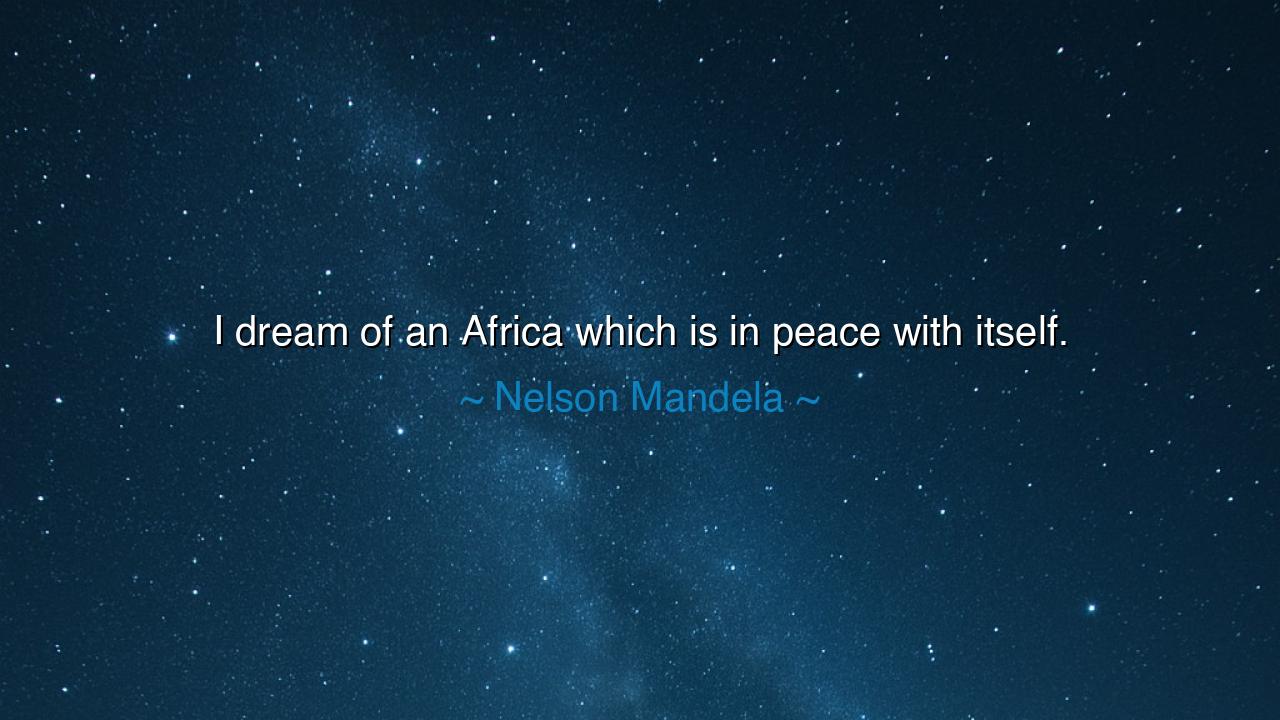
I dream of an Africa which is in peace with itself.






When Nelson Mandela declared, “I dream of an Africa which is in peace with itself,” he spoke as one who carried the weight of both chains and freedom upon his shoulders. These words are not merely the vision of a continent, but the cry of a soul that has known division, violence, and suffering. They echo through time as a call for unity, not only for Africa but for all peoples who have tasted the bitterness of strife. For Mandela, peace was not the absence of struggle, but the harmony born after justice has been done. His dream was of an Africa whose wounds no longer bleed against itself, where brothers do not turn spears upon brothers, and where the land of kings and sages stands whole and reconciled.
To understand the origin of this quote, we must see the life of the man who uttered it. Mandela, imprisoned for 27 years under the iron grip of apartheid, emerged not with vengeance, but with forgiveness. He lived in a South Africa torn apart by racial hatred, where the soil was soaked with mistrust and the people divided into enemies by unjust laws. When he spoke of an Africa at peace with itself, he dreamed first of his homeland, and then of a continent scarred by colonization, civil wars, and tribal divisions. His dream was born of suffering, but it was shaped by wisdom: he saw that true freedom cannot exist where the heart of a people is fractured.
The power of this vision lies in its humility. Mandela did not dream of riches, nor of conquest, nor of Africa rising above others. He dreamed of peace, of reconciliation within. This is wisdom older than kings: a man, a family, a nation cannot flourish if they are at war with themselves. Even the greatest empire crumbles when its heart is divided. The ancients taught that harmony within is the foundation of strength without. In these words, Mandela cast that eternal truth upon a continent that had suffered the storm of history’s harshest winds.
History gives us examples both tragic and triumphant. Look to Rwanda in 1994, when neighbor rose against neighbor in one of the most devastating genocides of modern times. The land bled because the people were not at peace with themselves. But in the years that followed, reconciliation took root, and slowly, painstakingly, wounds began to heal. This story reveals Mandela’s dream: not a land without scars, but a land where scars no longer breed hatred, where the memory of pain becomes the soil for unity. Peace within is not forgetting, but forgiving.
Mandela himself embodied this. Upon his release, he had every reason to call for retribution. Instead, he built bridges. He shook the hands of those who had once imprisoned him. He wore the jersey of the Springboks, once a hated symbol of apartheid, to unite his people through sport. His dream of an Africa at peace with itself began in the heart of one man who refused to let bitterness define him. Through his example, he taught the world that unity is not a gift given by time—it is a choice made by courage.
The lesson is clear: whether you are a continent or a single soul, you cannot prosper if you are divided within. Nations must seek reconciliation, families must mend their bonds, and individuals must silence the wars that rage inside their own hearts. Do not let resentment be your master; instead, let forgiveness be your weapon, and compassion your shield. In doing so, you become stronger than the forces that once sought to tear you apart.
Practically, this means striving each day for reconciliation. Speak to those you have quarreled with. Choose understanding where suspicion dwells. In workplaces, communities, and homes, seek dialogue before anger. And within yourself, confront the divisions of guilt, shame, or fear, and make peace with them. For a continent is but a reflection of its people, and a people are but reflections of their hearts. Peace on a grand scale begins with peace within.
Thus, Mandela’s words live on as prophecy and guidance. “I dream of an Africa which is in peace with itself.” Let us take this dream as our own—not only for Africa, but for every land, every people, and every soul. For the destiny of humanity is bound together. If Africa can find peace within itself, so too can the world. And if a man once imprisoned for decades can dream of reconciliation instead of revenge, then surely we too can dream, and act, to bring peace where division reigns. This is the heritage Mandela left us: a dream that becomes reality when each of us dares to live it.






AAdministratorAdministrator
Welcome, honored guests. Please leave a comment, we will respond soon